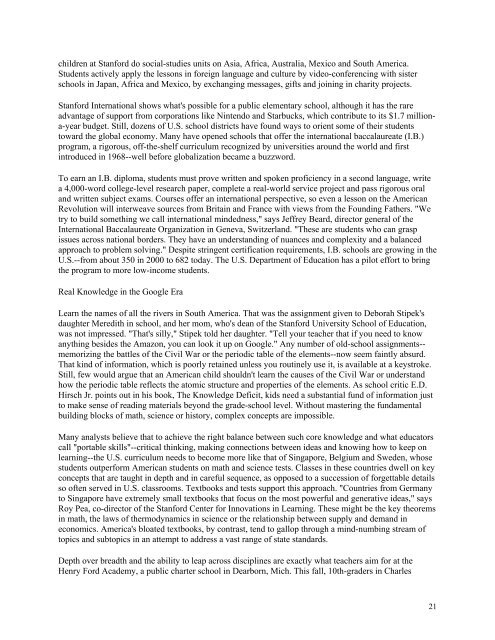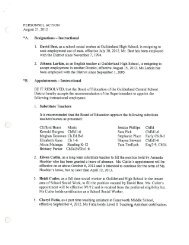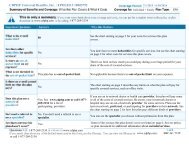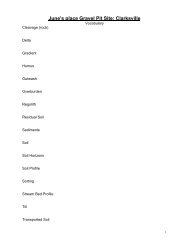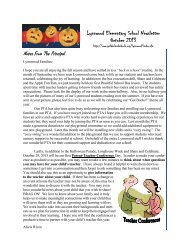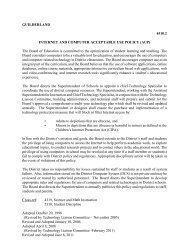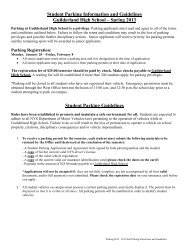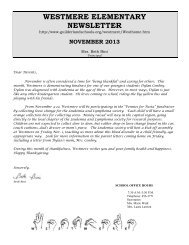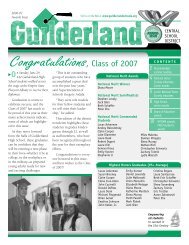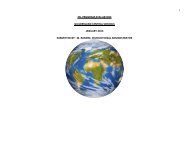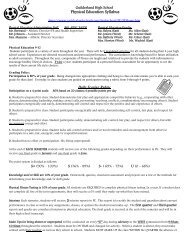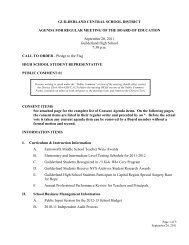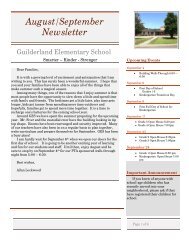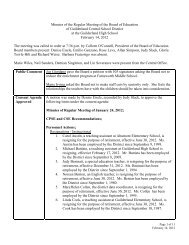How to Bring Our Schools Out of the 20th Century - Guilderland ...
How to Bring Our Schools Out of the 20th Century - Guilderland ...
How to Bring Our Schools Out of the 20th Century - Guilderland ...
You also want an ePaper? Increase the reach of your titles
YUMPU automatically turns print PDFs into web optimized ePapers that Google loves.
children at Stanford do social-studies units on Asia, Africa, Australia, Mexico and South America.<br />
Students actively apply <strong>the</strong> lessons in foreign language and culture by video-conferencing with sister<br />
schools in Japan, Africa and Mexico, by exchanging messages, gifts and joining in charity projects.<br />
Stanford International shows what's possible for a public elementary school, although it has <strong>the</strong> rare<br />
advantage <strong>of</strong> support from corporations like Nintendo and Starbucks, which contribute <strong>to</strong> its $1.7 milliona-year<br />
budget. Still, dozens <strong>of</strong> U.S. school districts have found ways <strong>to</strong> orient some <strong>of</strong> <strong>the</strong>ir students<br />
<strong>to</strong>ward <strong>the</strong> global economy. Many have opened schools that <strong>of</strong>fer <strong>the</strong> international baccalaureate (I.B.)<br />
program, a rigorous, <strong>of</strong>f-<strong>the</strong>-shelf curriculum recognized by universities around <strong>the</strong> world and first<br />
introduced in 1968--well before globalization became a buzzword.<br />
To earn an I.B. diploma, students must prove written and spoken pr<strong>of</strong>iciency in a second language, write<br />
a 4,000-word college-level research paper, complete a real-world service project and pass rigorous oral<br />
and written subject exams. Courses <strong>of</strong>fer an international perspective, so even a lesson on <strong>the</strong> American<br />
Revolution will interweave sources from Britain and France with views from <strong>the</strong> Founding Fa<strong>the</strong>rs. "We<br />
try <strong>to</strong> build something we call international mindedness," says Jeffrey Beard, direc<strong>to</strong>r general <strong>of</strong> <strong>the</strong><br />
International Baccalaureate Organization in Geneva, Switzerland. "These are students who can grasp<br />
issues across national borders. They have an understanding <strong>of</strong> nuances and complexity and a balanced<br />
approach <strong>to</strong> problem solving." Despite stringent certification requirements, I.B. schools are growing in <strong>the</strong><br />
U.S.--from about 350 in 2000 <strong>to</strong> 682 <strong>to</strong>day. The U.S. Department <strong>of</strong> Education has a pilot effort <strong>to</strong> bring<br />
<strong>the</strong> program <strong>to</strong> more low-income students.<br />
Real Knowledge in <strong>the</strong> Google Era<br />
Learn <strong>the</strong> names <strong>of</strong> all <strong>the</strong> rivers in South America. That was <strong>the</strong> assignment given <strong>to</strong> Deborah Stipek's<br />
daughter Meredith in school, and her mom, who's dean <strong>of</strong> <strong>the</strong> Stanford University School <strong>of</strong> Education,<br />
was not impressed. "That's silly," Stipek <strong>to</strong>ld her daughter. "Tell your teacher that if you need <strong>to</strong> know<br />
anything besides <strong>the</strong> Amazon, you can look it up on Google." Any number <strong>of</strong> old-school assignments--<br />
memorizing <strong>the</strong> battles <strong>of</strong> <strong>the</strong> Civil War or <strong>the</strong> periodic table <strong>of</strong> <strong>the</strong> elements--now seem faintly absurd.<br />
That kind <strong>of</strong> information, which is poorly retained unless you routinely use it, is available at a keystroke.<br />
Still, few would argue that an American child shouldn't learn <strong>the</strong> causes <strong>of</strong> <strong>the</strong> Civil War or understand<br />
how <strong>the</strong> periodic table reflects <strong>the</strong> a<strong>to</strong>mic structure and properties <strong>of</strong> <strong>the</strong> elements. As school critic E.D.<br />
Hirsch Jr. points out in his book, The Knowledge Deficit, kids need a substantial fund <strong>of</strong> information just<br />
<strong>to</strong> make sense <strong>of</strong> reading materials beyond <strong>the</strong> grade-school level. Without mastering <strong>the</strong> fundamental<br />
building blocks <strong>of</strong> math, science or his<strong>to</strong>ry, complex concepts are impossible.<br />
Many analysts believe that <strong>to</strong> achieve <strong>the</strong> right balance between such core knowledge and what educa<strong>to</strong>rs<br />
call "portable skills"--critical thinking, making connections between ideas and knowing how <strong>to</strong> keep on<br />
learning--<strong>the</strong> U.S. curriculum needs <strong>to</strong> become more like that <strong>of</strong> Singapore, Belgium and Sweden, whose<br />
students outperform American students on math and science tests. Classes in <strong>the</strong>se countries dwell on key<br />
concepts that are taught in depth and in careful sequence, as opposed <strong>to</strong> a succession <strong>of</strong> forgettable details<br />
so <strong>of</strong>ten served in U.S. classrooms. Textbooks and tests support this approach. "Countries from Germany<br />
<strong>to</strong> Singapore have extremely small textbooks that focus on <strong>the</strong> most powerful and generative ideas," says<br />
Roy Pea, co-direc<strong>to</strong>r <strong>of</strong> <strong>the</strong> Stanford Center for Innovations in Learning. These might be <strong>the</strong> key <strong>the</strong>orems<br />
in math, <strong>the</strong> laws <strong>of</strong> <strong>the</strong>rmodynamics in science or <strong>the</strong> relationship between supply and demand in<br />
economics. America's bloated textbooks, by contrast, tend <strong>to</strong> gallop through a mind-numbing stream <strong>of</strong><br />
<strong>to</strong>pics and sub<strong>to</strong>pics in an attempt <strong>to</strong> address a vast range <strong>of</strong> state standards.<br />
Depth over breadth and <strong>the</strong> ability <strong>to</strong> leap across disciplines are exactly what teachers aim for at <strong>the</strong><br />
Henry Ford Academy, a public charter school in Dearborn, Mich. This fall, 10th-graders in Charles<br />
21


